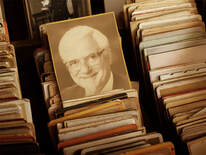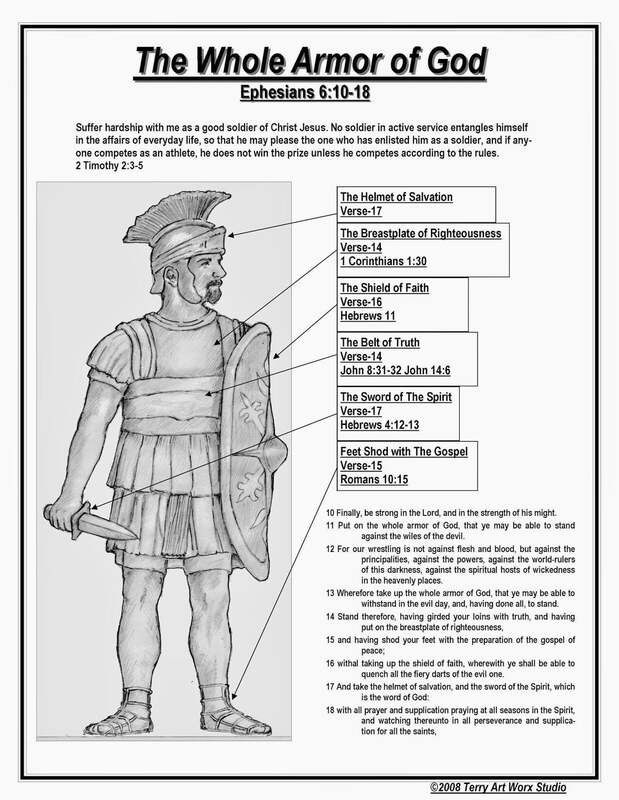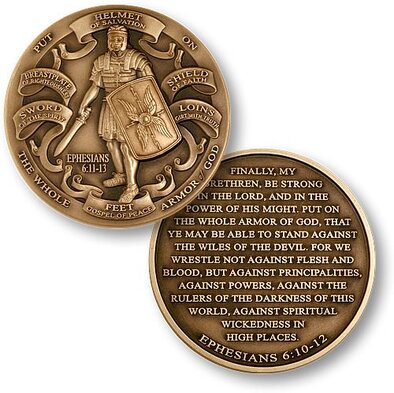Ephesians 6
 Kurt Trucksess Files
Kurt Trucksess Files
Children obeying their parents is a direct command from God. Ephesians 6:1 says, “Children, obey your parents in the Lord, for this is right.” In this verse, obeying one’s parents can not be separated from honoring one’s parents. Ephesians 6 continues, “Honor your father and mother — which is the first command with a promise — so that it may go well with you and that you may enjoy long life on earth.”
“Honor” means children are to have an attitude of respect toward their parents. A child’s obedience to their parents is to be done with an attitude of honor. Obedience with a bad attitude does not conform to the command.
It may be challenging for some children to learn to obey their parents. A strong will certainly makes it harder for some children than others. There is a good reason for this command. Proverbs 13:1 teaches that those who listen to their parents will gain wisdom: “A wise son heeds his father’s instruction, but a mocker does not respond to rebukes.” God’s design is for children to learn to honor and obey their parents so when they grow up they will learn to live wisely. As they learn respect at home, they will learn respect for others when they leave the home.
Even Jesus, though he was the Son of God, obeyed his earthly parents and as a result, he grew in wisdom (See Luke 2:51-52). The Bible also says that children who are not disciplined or who fail to learn to obey their parents will be much worse off in life. Proverbs 29:15 reminds us, “The rod and reproof give wisdom, but a child left to himself brings shame to his mother.” Proverbs 29:17 also says, “Discipline your son, and he will give you rest; he will give delight to your heart.” --Kurt Trucksess; Cross Winds Church
“Honor” means children are to have an attitude of respect toward their parents. A child’s obedience to their parents is to be done with an attitude of honor. Obedience with a bad attitude does not conform to the command.
It may be challenging for some children to learn to obey their parents. A strong will certainly makes it harder for some children than others. There is a good reason for this command. Proverbs 13:1 teaches that those who listen to their parents will gain wisdom: “A wise son heeds his father’s instruction, but a mocker does not respond to rebukes.” God’s design is for children to learn to honor and obey their parents so when they grow up they will learn to live wisely. As they learn respect at home, they will learn respect for others when they leave the home.
Even Jesus, though he was the Son of God, obeyed his earthly parents and as a result, he grew in wisdom (See Luke 2:51-52). The Bible also says that children who are not disciplined or who fail to learn to obey their parents will be much worse off in life. Proverbs 29:15 reminds us, “The rod and reproof give wisdom, but a child left to himself brings shame to his mother.” Proverbs 29:17 also says, “Discipline your son, and he will give you rest; he will give delight to your heart.” --Kurt Trucksess; Cross Winds Church
- ephesians 6:10-13 -
|
Ephesians 6:13-15:
13 Therefore take up the whole armor of God, that you may be able to withstand in the evil day, and having done all, to stand. 14 Stand therefore, having girded your waist with truth, having put on the breastplate of righteousness, 15 and having shod your feet with the preparation of the gospel of peace; |
In the words "armor of God," the operative word is that it is "Of" God. It is from Him. He gives us the armor. No battle is fought and no battle is won with the armor from God. Our duty is to receive it.
The devil declared war against you before you were even born
There is no draft for spiritual warfare. Yo don't get saved and then wait for a notice of draft from God. He doesn't selectively draft people who can be deemed capable for battle. There are no people labeled as "4-F" in God's army. You were inducted the very moment you entered into salvation via relationship with Jesus Christ. (The key being the word "relationship") The devil declared war against you before you were even born and takes special notice of you the day you become born again. So there is no draft. The good news is that God immediately makes available to you the equipment you need as weapons of warfare in the battles you will face. He has already won it for you. So you just need to follow Him through. You also have angels watching over you. So if you are feeling the "burn," --then rejoice. The devil doesn't want to hurt you..he wants to kill you. If you weren't important to God and God's army..the devil would leave you alone. |
What vital organ of the body does the breastplate protect? The heart. The protection of the heart is the purpose of the breastplate of righteousness through faith which works by love. Bear in mind that”scriptural faith is always in the heart, not in the head. For instance, Romans 10:10 says, “For with the heart one believes unto righteousness.” Real faith is not just intellectual concepts nor theology nor doctrine. It is heart faith which works along one primary line—love. In conjunction with this, look at Galatians 5:6: For in Christ Jesus neither circumcision nor uncircumcision avails anything, but faith working through love. That is a simple, yet profound, statement. We need to constantly remind ourselves that the only thing that really matters in the whole Christian life is faith that works by love. We can get so sophisticated that we have answers to all sorts of theological questions and still miss the one central reality—faith in the heart working by love. Without that, you have missed it all. The breastplate that protects the heart is faith that works through love. Once the breastplate is removed, our most delicate vital organ, the heart, is exposed. Concerning the nature of faith, we need to see that it always relates to the invisible, never to the visible. As 2 Corinthians 5:7 states very simply, “For we walk by faith, not by sight.” Walk means “live.” Our whole life as Christians is based not on what we see, but on what we believe. It is by faith, not by sight, and these two are in opposition to one another. If we go by what we see, we are not going by what we believe This whole issue was the very first mistake that humanity made. When the serpent in the Garden of Eden questioned the word of God, and Eve entertained that question, she was defeated. Genesis 3:6 tells us what pressure Eve responded to: “So when the woman saw that the tree was good for food.” The key word there is saw. Eve moved out from the realm of faith in the invisible word to trusting her sight; the very next moment, she was defeated. This same principle applies to us. When we go by what we see, we are no match for the devil. We must walk by faith, not by sight. The breastplate that protects our heart is faith in the invisible God and His word, and this faith works by love. The moment we abandon that faith, we cease to be truly loving. Some people say, “Love is more important than faith.” That may be, but the only way to love is by faith. Since faith works through love, it is no wonder we get irritable, frustrated, impatient, and snap at our spouses the moment we let the breastplate down. Our faith, which is the only thing that produces love, has gone. Consequently, out comes the old man with all its nasty quirks and idiosyncrasies. But what is the basic problem? The breastplate has been lowered -Derek Prince |
Those “darts,” our inner dialogue, come from many sources, including our own analysis, our hearts’ desires, the opinions we hear from others, what we read, watch, and hear. Without being viewed through the filter of truth, the influence of the darts turns us toward worry, hate, lack of self-control, criticism, discontent, and many other responses which are the opposite of the fruit of the Spirit (Gal. 5:22-23). When we use the filter of the truth of Scripture and who God is, we experience the fruit of the Spirit: love, joy, peace, longsuffering, gentleness, goodness, faith, meekness, and temperance. (Crosswalk)
| It is impossible to equip yourself with the armor of God without prayer. Colossians 1:9-14 “For this reason, since the day we heard about you, we have not stopped praying for you and asking God to fill you with the knowledge of his will through all spiritual wisdom and understanding. And we pray this in order that you may live a life worthy of the Lord and may please him in every way: bearing fruit in every good work, growing in the knowledge of God, being strengthened with all power according to his glorious might so that you may have great endurance and patience, and joyfully giving thanks to the Father, who has qualified you to share in the inheritance of the saints in the kingdom of light. For he has rescued us from the dominion of darkness and brought us into the kingdom of the Son he loves, in whom we have redemption, the forgiveness of sins” (NIV). |
Ephesians 6:10-18 seems to borrow from Jewish Scripture and traditions that depict the Lord as a warrior armed with righteousness, salvation, and vengeance ready to repay his enemies and deliver his people (Isaiah 59:14–19; compare Wisdom of Solomon 5.15–23). In Ephesians, however, Christ’s followers are to put on the metaphoric armor, the panoply (panoplia: the full set of armor and weapons) furnished by God. In Roman warfare, it was the hastati (“armed with a spear”), mature soldiers, who would wear the panoply (Polybius, History of the World 6). And among the Greeks, city-state inhabitants considered it a privilege, not a duty, to engage in military action. There is no reason why Christians today cannot apply this mindset and these verses from Ephesians 6 when facing trials, temptations, and spiritual challenges. Other passages attributed to Paul the apostle likewise encourage believers to wear spiritual armor and engage is battle: 1 Thessalonians 5:8; Romans 13:12. Paul and his colleagues likewise do so: 1 Timothy 1:18–19; 2 Timothy 2:3–4; 2 Corinthians 6:7; 10:3–6. -In Christ
|
Ephesians 6:14A:
Stand therefore, having girded your waist with truth NIV: Stand firm then, with the belt of truth buckled around your waist,
|
|
| “For the word of God is alive and active. Sharper than any double-edged sword, it penetrates even to dividing soul and spirit, joints and marrow; it judges the thoughts and attitudes of the heart.” (Hebrews 4:12) |
This piece of the armor protects us against the lies and deceptions of the enemy. Scripture does call Satan the father of lies (John 8:44). As we see in Scripture, the devil likes to operate in half-truths (Genesis 3). He twists the truth ever so slightly to cause people to stumble away from God’s truth.
The belt of truth prevents us from falling prey to the devil’s lies. If we don’t have an understanding of the truth, the rest of the armor is useless. If we have the belt on crooked, we’ll have difficulty gripping the Sword of the Spirit (God’s word) in time, and risk having our more vital organs exposed. -Crosswalk
The belt of truth prevents us from falling prey to the devil’s lies. If we don’t have an understanding of the truth, the rest of the armor is useless. If we have the belt on crooked, we’ll have difficulty gripping the Sword of the Spirit (God’s word) in time, and risk having our more vital organs exposed. -Crosswalk
| The enemy is the father of lies and will seek to deceive us in any way that he can. Even twisting Scripture for his own purpose. In a world that is filled with ‘fake news’ and appealing sound bytes, it is important to not believe everything you see or hear. And this is true not just in politics and social issues. It is true as well concerning the Scripture. Find out what is true, and hold to that.
Don’t let the enemy deceive and trap you with his lies. Know the truth --A Clay Jar; https://aclayjar.net/2019/07/belt-of-truth/ |
The belt—known as the cingulum or balteus—held the Roman soldier’s scabbard and sword. The belt provided a place to house the sword and carry it into battle effectively. The spiritual sword is the Bible, the Word of God, as shown in Ephesians 6:17. This is another piece of the armor of God.
The Roman military belt was also a status symbol in the first century. Roman soldiers wore their belts on or off duty, and so the belt itself became a badge of identification. In fact, it became such an important part of the soldiers’ identity that their superior officers would sometimes deprive them of their belts as a public, humiliating punishment.
Jesus explained, “Everyone who is of the truth hears My voice.” If the belt was a central part of the Roman soldier’s identity, then taking up the belt of truth tells us that truth ought to be a central part of our identity. - Dave Johnson; Life Hope & truth
The Roman military belt was also a status symbol in the first century. Roman soldiers wore their belts on or off duty, and so the belt itself became a badge of identification. In fact, it became such an important part of the soldiers’ identity that their superior officers would sometimes deprive them of their belts as a public, humiliating punishment.
Jesus explained, “Everyone who is of the truth hears My voice.” If the belt was a central part of the Roman soldier’s identity, then taking up the belt of truth tells us that truth ought to be a central part of our identity. - Dave Johnson; Life Hope & truth
| A Roman soldier wore a tunic under his armor, and a large leather belt “was used to gather his garments together as well as hold his sword.”1 The belt was the first part of the armor put on, and it held everything else together. It was crucial. Similarly, truth is a crucial component for every believer in this spiritual battle—without it believers are not prepared to stand and fight. |
|
Satan, as the father of lies, does not want us to know the truth about such questions. Satan seeks to spread as much disinformation as possible about these critical questions. Remember, the one tactic the devil uses in setting traps for us is to question and challenge the truth of God’s Word. God has revealed in Scripture the answers to our most pressing questions about life and eternity, and Satan seeks to obscure, challenge, and distort the truth of what God has revealed. -Redeeming God
|
BUCKLED UP BY THE BELT OF TRUTH (EPH. 6:14A): Roman soldier had a think leather belt that held their gear in place and could cinch up their tunic for battle. Normal dress for a soldier was a large square of material with head and arm holes that draped loosely over the body. In any combat that looseness of the garment ended. No tangles were desired, and the belt held fast the cinched up tunic.
Truth is to hold us up, hold us in, and protect us from falling. This belt of truth is much like the restraints we strap around us when we get into one of those dangerous, high speed twisting, turning rollercoaster rides at some amusement park. The belt and bars that hold us are designed to keep us safe no matter how fast the car spins, twists or drops. We are held in. Truth holds us in.
This word (aletheia) means both the content of truth, and the truthfulness of our life. God wants both. He wants us to know the content of truth and live the integrity of truthfulness. Truth means we have the readiness to obey; we have the integrity of commitment to truth; and we are opposed to all deception, dishonesty. We have no loose ends of our life that dangle and trip us up. We are girded, belted, strapped in by truth.
1. Knowing the truth saves us. (Jn. 8:32; 17:3)
2. Eating the truth sanctifies us, which means it makes us useful to God. (Jn. 17:17)
3. Surrendering to the truth transforms us (Rm. 12:1-2)
4. Obeying the truth stabilizes us (2 Tim. 2:4; Heb. 12:1-2) Our lives are to be surrounded and held together by truth we know, believe, and practice.
BELT OF TRUTH. Vital to every soldier was this belt from which all tools of battle hung. This belt also held the soldier's robe together. To the Christian soldier a belt of truth means "honesty," "truthfulness," "integrity," and "sincerity" surrounds every part of our life.
WARNING: Dishonesty brings defeat!
Then he said in verse 14, "having girded your loins with truth." So this guy is first of all, taking this long garment of Roman soldiers. To get the idea, imagine that you just took a big sheet and cut a hole for the head and pulled it over your head. Presto, that would be what a tunic would be in the ancient world. Can you imagine trying to do anything with this sheet flapping and flopping all around you? You'd look like a ghost - especially if you are going to battle, it would get all wrapped around you and fly up over your face and so they had to put a belt on to hold it and keep it from flapping up. But if you wanted to run and that was all the way down to the ground, you had to pull it up and tuck it in your belt. It would be kind of like taking your bedspread and cutting a hole in it and pulling it down and then trying to go running. You have to put a belt on and then tuck it in. And that's what he's talking about - having your loins girded with truth - putting on your belt.
Truth is to hold us up, hold us in, and protect us from falling. This belt of truth is much like the restraints we strap around us when we get into one of those dangerous, high speed twisting, turning rollercoaster rides at some amusement park. The belt and bars that hold us are designed to keep us safe no matter how fast the car spins, twists or drops. We are held in. Truth holds us in.
This word (aletheia) means both the content of truth, and the truthfulness of our life. God wants both. He wants us to know the content of truth and live the integrity of truthfulness. Truth means we have the readiness to obey; we have the integrity of commitment to truth; and we are opposed to all deception, dishonesty. We have no loose ends of our life that dangle and trip us up. We are girded, belted, strapped in by truth.
1. Knowing the truth saves us. (Jn. 8:32; 17:3)
2. Eating the truth sanctifies us, which means it makes us useful to God. (Jn. 17:17)
3. Surrendering to the truth transforms us (Rm. 12:1-2)
4. Obeying the truth stabilizes us (2 Tim. 2:4; Heb. 12:1-2) Our lives are to be surrounded and held together by truth we know, believe, and practice.
BELT OF TRUTH. Vital to every soldier was this belt from which all tools of battle hung. This belt also held the soldier's robe together. To the Christian soldier a belt of truth means "honesty," "truthfulness," "integrity," and "sincerity" surrounds every part of our life.
WARNING: Dishonesty brings defeat!
Then he said in verse 14, "having girded your loins with truth." So this guy is first of all, taking this long garment of Roman soldiers. To get the idea, imagine that you just took a big sheet and cut a hole for the head and pulled it over your head. Presto, that would be what a tunic would be in the ancient world. Can you imagine trying to do anything with this sheet flapping and flopping all around you? You'd look like a ghost - especially if you are going to battle, it would get all wrapped around you and fly up over your face and so they had to put a belt on to hold it and keep it from flapping up. But if you wanted to run and that was all the way down to the ground, you had to pull it up and tuck it in your belt. It would be kind of like taking your bedspread and cutting a hole in it and pulling it down and then trying to go running. You have to put a belt on and then tuck it in. And that's what he's talking about - having your loins girded with truth - putting on your belt.
| Luke 12:35
Let your loins be girded about, and your lights burning; |
| "Be dressed ready for service and keep your lamps burning." (12:35)
The lamps (Greek lychnos) referred to are the small clay lamps. To keep them burning requires both an expenditure of effort and resources. Lamps kept burning must be refilled periodically with olive oil, the wicks must be trimmed occasionally, and they must be checked lest the wind were to blow one out. In California, we experienced an energy shortage for which the government mandated electricity savings. We shut off unneeded lights, stores were half lit, and auto malls no longer had as many lights blazing. During this emergency, to leave lights on was wasteful, even illegal. Energy frugality was the law in California. But not in Jesus' kingdom. Until the master comes, the lights will remain lit so that when he arrives, the house is prepared for his entrance. Now isn't the time to relax and cut back, but a time for renewed vigilance, renewed effort, renewed investment of our energy as we prepare for Jesus' coming. Dr Ralph Wilson; Jesus Walk; http://www.jesuswalk.com/luke/057-alert.htm |
|
Ephesians 6:14B:
having put on the breastplate of righteousness, |
|
| Isaiah 59:17:
He put on righteousness as his breastplate,
and the helmet of salvation on his head;
he put on the garments of vengeance
and wrapped himself in zeal as in a cloak. |
At salvation, a “breastplate” is issued to each repentant sinner. It is specially designed by God to protect our heart and soul from evil and deception. Our own righteous acts are no match for Satan’s attacks (Isaiah 64:6). The breastplate of righteousness has Christ’s name stamped on it, as though He said, “Your righteousness isn’t sufficient to protect you. Wear mine.” -Got Questions
| Righteousness, which is the perfect holiness of Christ, comes from God alone. Righteousness is to be right in God’s eyes. In essence, perfect living. To flee from the snares of temptation and sin Satan has set up and to follow God’s plan for our lives.
-Hope Bolinger; Crosswalk |
I t’s interesting that Paul talks about the breastplate so early on, because it shows us where Satan is prone to attack us. He’s going to come after our hearts. When you think about spiritual attack, many of us think about all kinds of weird things like you see in horror movies: lights flickering, doors slamming, rooms becoming cold, and cupboard doors opening and closing by themselves. That’s the horror movie version of spiritual attack, but it’s not how spiritual attack usually happens. One of the most common ways that Satan attacks us is by going after our hearts. He knows that if he get to our hearts, he can inflict a mortal wound.
What is the heart? The heart in Scripture represents our inmost being, the essence of who we are. One scholar says this:
The Bible uses the heart and reins to refer to the seat of the thoughts and the deep motives and emotions of men. People in Paul’s day believed that organs such as the heart and the liver were the center of affections. Emotions such as joy or anger originated in these organs. The apostle Paul used this understanding, unscientific though it was, to teach important spiritual lessons. He said believers must put on the breastplate of righteousness to protect the vital parts of the inner man and its faculties against the attacks of Satan. In their conflict with the invisible powers, believers are most vulnerable in their thoughts, motives, and emotions. They need strong protection—a breastplate of righteousness—to keep from being wounded in their inmost being. (Joel Beeke)
This is where we can expect attack: Satan will attack our thoughts. our motives - our emotions.
-Dash House
What is the heart? The heart in Scripture represents our inmost being, the essence of who we are. One scholar says this:
The Bible uses the heart and reins to refer to the seat of the thoughts and the deep motives and emotions of men. People in Paul’s day believed that organs such as the heart and the liver were the center of affections. Emotions such as joy or anger originated in these organs. The apostle Paul used this understanding, unscientific though it was, to teach important spiritual lessons. He said believers must put on the breastplate of righteousness to protect the vital parts of the inner man and its faculties against the attacks of Satan. In their conflict with the invisible powers, believers are most vulnerable in their thoughts, motives, and emotions. They need strong protection—a breastplate of righteousness—to keep from being wounded in their inmost being. (Joel Beeke)
This is where we can expect attack: Satan will attack our thoughts. our motives - our emotions.
-Dash House
| God provides the ‘breastplate’ We have seen that God is holy, righteous, and just. Our sin separates us from Him. We cannot make ourselves good enough, nor do enough good things, to attain righteousness. However, God gave us a solution to that problem. Jesus’ death on the cross provides the way for us to be reconciled to God; Jesus’ righteousness is accounted to us so that we can be seen, by God, as righteous, “And to the one who does not work but believes in him who justifies the ungodly, his faith is counted as righteousness” (Romans 4:5 ESV, see also Romans 4:11; Galatians 3:5-7). --Robert Driskoll; What Christians Want To Know |
In biological terms, we understand that the heart is a muscle which pumps blood carrying oxygen and nutrients to the rest of the body. Blood is the life force of the body and thus the heart is necessary to life.
In spiritual terms, we understand that the heart is the center of emotions, experience. The ancient Greeks also considered it to be the center of intellectual life. To speak of the heart was to speak of the soul, the very essence of a person.
In spiritual terms, we understand that the heart is the center of emotions, experience. The ancient Greeks also considered it to be the center of intellectual life. To speak of the heart was to speak of the soul, the very essence of a person.
|
Ephesians 6:15:
and having shod your feet with the preparation of the gospel of peace; |
To Shod means to bind under one’s feet, to be in bonds, to tie, to wind, to knit or be at one with. It also has to do with your walk, or how you walk out your life from day-to-day.
Preparation means having a firm foundation or solid knowledge of something. In this case, preparation is knowing the Prince of Peace and His Word. The word Gospel means glad tidings or good news of the kingdom of God. --MaryEllenWrites |

The word preparation used by Paul in Ephesians 6:15 comes from the Greek word hetoimasia. Vine’s Complete Expository Dictionary of Old and New Testament Words says this about the word hetoimasia in this context: “The Gospel itself is to be the firm footing of the believer, his walk being worthy of it and therefore a testimony in regard to it.”
The Greek Septuagint translation of the Old Testament uses the same word, hetoimasia, to convey the meaning of a firm foundation in Psalm 89:14: “Righteousness and justice are the foundation of Your throne; mercy and truth go before Your face” (emphasis added throughout).
Just as righteousness and justice underpin the throne of God, so the gospel message provides the solid footing a Christian must have. The gospel of peace provides us with the preparation, or foundation, we need to face life’s spiritual battles.
The Greek Septuagint translation of the Old Testament uses the same word, hetoimasia, to convey the meaning of a firm foundation in Psalm 89:14: “Righteousness and justice are the foundation of Your throne; mercy and truth go before Your face” (emphasis added throughout).
Just as righteousness and justice underpin the throne of God, so the gospel message provides the solid footing a Christian must have. The gospel of peace provides us with the preparation, or foundation, we need to face life’s spiritual battles.
 Martin Luther Files
Martin Luther Files
“So when the Devil throws your sins in your face and declares that you deserve death and hell, tell him this: I admit that I deserve death and hell, what of it? For I know One who suffered and made satisfaction on my behalf. His name is Jesus Christ, Son of God, and where he is there I shall be also!”
--Martin Luther
“So when the Devil throws your sins in your face and declares that you deserve death and hell, tell him this: I admit that I deserve death and hell, what of it? For I know One who suffered and made satisfaction on my behalf. His name is Jesus Christ, Son of God, and where he is there I shall be also!”
--Martin Luther

The apostle Paul encourages us to intercede (pray) for Church members and ministers, “praying always with all prayer and supplication in the Spirit, being watchful to this end with all perseverance and supplication for all the saints—and for me, that utterance may be given to me, that I may open my mouth boldly to make known the mystery of the gospel, for which I am an ambassador in chains” (Ephesians 6:18-20).
Paul urges us “that supplications, prayers, intercessions, and giving of thanks be made for all men, for kings and all who are in authority, that we may lead a quiet and peaceable life in all godliness and reverence” (1 Timothy 2:1-2, emphasis added throughout). -Mike Bennett |

The sword of the Spirit (verse 17) is the Word of God. This sword can be used for both attack and defense, but it is primarily a weapon of attack. Someone has said, “The best defense is attack”—and this is often true in the spiritual realm. The word here translated word is rhema, which usually denotes a word that is spoken. It is not the Bible in our bookshelf or even on our nightstand that is effective. But when we take Scripture in our mouth and proclaim it boldly through our lips, then it becomes a sharp, two-edged sword. Note, too, that it is “the sword of the [Holy] Spirit.” We can take God’s Word in our mouth, but it only achieves its full effect when it is the Holy Spirit within us who actually wields it. The perfect pattern of how to use the sword of the Spirit is provided by the encounter of Jesus with Satan at the time of His temptation in the wilderness. Three times Satan approached Jesus with a temptation and each time Jesus drove him back with the same phrase: “It is written.” Jesus used no other weapon but the rhema—the spoken word of the Lord. God has made the same weapon available to each Christian. It is important, however, to bear two things in mind. First, Jesus had already been “filled with the Holy Spirit.” It was the Holy Spirit in Jesus that directed Him in the use of the sword. Second, Jesus—like every Jewish boy of His day—had memorized long passages of Scripture. When Satan confronted Him, He did not need to consult a concordance or go to a library. He had already stored up the Scriptures in His memory. Surely we today need to do that just as much as Jesus did. -Derek Prince
|

Every day, every one of us has thousands, even millions, of thoughts which could be identified as a variety of goals, plans, questions, ideas, conclusions, and analysis of circumstances. Like arrows being flung toward our minds and hearts, we are bombarded. Many of those arrows are truth. Many of them are lies. The truths foster trust in God and acknowledgment of his Lordship in our lives. The lies create doubt, confusion, wrong conclusions, and ultimately questioning God’s nature—his goodness, motives, faithfulness, and many other attributes.
Ephesians 6:16 tells us, “Above all, taking the shield of faith, wherewith ye shall be able to quench all the fiery darts of the wicked.” Those “darts,” our inner dialogue, come from many sources, including our own analysis, our hearts’ desires, the opinions we hear from others, what we read, watch, and hear. Without being viewed through the filter of truth, the influence of the darts turns us toward worry, hate, lack of self-control, criticism, discontent, and many other responses which are the opposite of the fruit of the Spirit (Gal. 5:22-23). When we use the filter of the truth of Scripture and who God is, we experience the fruit of the Spirit: love, joy, peace, longsuffering, gentleness, goodness, faith, meekness, and temperance.
--Kathy Collard Miller: Crosswalk: What Does the Phrase 'Casting Down Imaginations' Mean in the Bible
Ephesians 6:16 tells us, “Above all, taking the shield of faith, wherewith ye shall be able to quench all the fiery darts of the wicked.” Those “darts,” our inner dialogue, come from many sources, including our own analysis, our hearts’ desires, the opinions we hear from others, what we read, watch, and hear. Without being viewed through the filter of truth, the influence of the darts turns us toward worry, hate, lack of self-control, criticism, discontent, and many other responses which are the opposite of the fruit of the Spirit (Gal. 5:22-23). When we use the filter of the truth of Scripture and who God is, we experience the fruit of the Spirit: love, joy, peace, longsuffering, gentleness, goodness, faith, meekness, and temperance.
--Kathy Collard Miller: Crosswalk: What Does the Phrase 'Casting Down Imaginations' Mean in the Bible
|
Ephesians 6:18:
Praying always with all prayer and supplication in the Spirit, and watching thereunto with all perseverance and supplication for all saints; |
“I urge, then, first of all, that petitions, prayers, intercession and thanksgiving be made for all people” (1 Timothy 2:1). Spirit filled prayer, along with the Word of God, are the two weapons of offense in the list of God's armor. |
 C Peter Wagner Files
C Peter Wagner Files
“God’s purpose may be thwarted or it may be accomplished depending, to one degree or another, on the obedience of His people and their willingness to use the weapons of spiritual warfare that He has provided. God is powerful enough to win any battle, but He has designed things so that the release of His power at a given moment of time often is contingent upon the decisions and the actions of His people. A principle weapon of spiritual warfare is prayer. Not just routine or mediocre prayer, but prayer powerful enough to move God’s hand in order to determine the destiny of a whole nation.” ---C. Peter Wagner

"When Paul talks about spiritual warfare in Ephesians 6, prayer is the seventh piece of armor. It activates all of the rest of the spiritual armor," she said. "When we refuse to pray, it's like having a refrigerator without plugging it in. Prayer is the divinely authorized mechanism God has given us to tap into His power. Without prayer, we'll be ineffective in spiritual warfare. But with it, we will be victorious."........."The spiritual armor in Ephesians 6:10-20 (truth, righteousness, peace, faith, salvation, God's Word, prayer) is merely a repeat, a different way of describing what Paul had already been explaining in the rest of his letter. Because how could the readers ‘put on' or ‘take up' armor that they didn't understand or even know they had? The first step for them — the first step for us — in utilizing the spiritual resources we've been given is to have our spiritual eyes opened so that we can see them," she said.
To that end, Priscilla urges us to pray for more spiritual vision. She says we should ask the Lord to open our eyes to see the enemy's activity and to be more aware of the spiritual resources He has given us to disarm and defeat him. Victory is available to us, but it will only come as we pray for God's help in the battle.
We're in a spiritual war that can only be won with spiritual resources, but we've got to know we have these spiritual resources at our disposal, and we've got to use them. Prayer is crucial for both. --Matt Erickson
To that end, Priscilla urges us to pray for more spiritual vision. She says we should ask the Lord to open our eyes to see the enemy's activity and to be more aware of the spiritual resources He has given us to disarm and defeat him. Victory is available to us, but it will only come as we pray for God's help in the battle.
We're in a spiritual war that can only be won with spiritual resources, but we've got to know we have these spiritual resources at our disposal, and we've got to use them. Prayer is crucial for both. --Matt Erickson
|
So your victory may look like your willingness to continue believing in a salvation that the world tells you is ridiculous.
When it comes to using prayer as a weapon of spiritual warfare, victory is fundamentally about trust. Do you believe that your battles are His battles? Do you trust that when you bring a heartfelt need to God, He hears you and will respond? The Bible says the Lord will fight for you and that Jesus has already won the ultimate victory by defeating death on your behalf on the cross. His resurrection was the declaration of victory in the war to end all wars. But until Jesus returns or calls you home to heaven, spiritual warfare will remain a reality in your life. God wants you to experience a sense of victory in the battles you face. Prayer is His chosen means of offering that to you. That’s why it is often said that victory in this conflict is won on your knees. -Ross McCall |

God has chosen intercession as the primary means in which He releases His power now and forever. Jesus operated in the principle of intercession when He created the earth by speaking the Word to the Father (Genesis 1). He releases His power now and will rule the nations forever in partnership with His people through intercession.
|
|
“The god of this age has blinded the minds of unbelievers, so that they cannot see the light of the gospel that displays the glory of Christ, who is the image of God.” — 2 Corinthians 4:4, NIV.........For everything in the world — the lust of the flesh, the lust of the eyes, and the pride of life — comes not from the Father but from the world.
(1 John 2:16, New International Version) |
Notes On Prayer by Elisabeth Elliot:
People who ski, I suppose, are people who happen to like skiing, who have time for skiing, who can afford to ski, and who are good at skiing. Recently I found that I often treat prayer as though it were a sport like skiing–something you do if you like it, something you do in your spare time, something you do if you can afford the trouble, something you do if you’re good at it. Otherwise you do without it most of the time. When you get in a pinch you try it and then you call an expert. But prayer isn’t a sport. It’s work. As soon as I’ve said that I’m in trouble because so many sports have become professional and as such are almost wholly indistinguishable from work. I could say that work is something you have to decide to do, you have to allow time for, you have to go at with energy, skill and concentration. But all those things could be said of the big business which is sports. Competition is deadly, equipment highly technical and expensive, salaries absurdly high. But prayer is no game.
Even if you are part of a “team,” as when others join you in prayer, you are not cheered on by spectators or coached by any experts. You won’t get any trophies–not on this side of the Jordan, anyway. It’s not likely you’ll get any credit at all. For some people prayer might fall into the category of “fun,” but that’s not usually the reason we pray. It’s a matter of need and responsibility. Prayer is work because a Christian simply can’t “make a living” without it. He can’t live a Christian life at all if he doesn’t pray.
Prayer is the opposite of leisure. It’s something to be engaged in, not indulged in. It’s a job you give first priority to, performing not when you have energy left for nothing else. “Pray when you feel like praying,” somebody has said. “Pray when you don’t feel like praying. Pray until you do feel like praying.” If we pray only “at our leisure”–that is, at our own convenience–can we be true disciples? Jesus said, “Anyone who wants to follow me must put aside his own desires and conveniences” (Luke 9:23 LB). The apostle Paul did use an analogy from sports to describe prayer. He said we “wrestle.” In the wrestling of a Christian in prayer, “our fight is not against any physical enemy: it is against organizations and powers that are spiritual. We are up against the unseen power that controls this dark world, and spiritual agents from the very headquarters of evil” (Eph. 6:12, Phillips). Seldom do we consider the nature of our opponent, and that is to his advantage. When we do recognize him for what he is, however, we have an inkling as to why prayer is never easy. It’s the weapon that Unseen Power dreads most, and if he can get us to treat it as casually as we treat a pair of skis or a tennis racquet he can keep his hold. If we’re going to ask, “Is prayer work?” somebody will want to ask, “Does prayer work?” That question assumes that results ought to be measurable.
The trouble is they are not by any means always measurable or predictable because the One to whom we address our prayers is infinite and incomprehensible, “and all that is comprehensible about him” (wrote John of Damascus) “is his infinity and incomprehensibility.” His thoughts are as much higher than our thoughts as the heavens are higher than the earth. And he is Love. Infinite Love will never give a stone when bread is asked for, or a scorpion in place of an egg. But what will Infinite Love give if our prayer is for a scorpion? Prayer is compared in the Bible to incense. “Let my prayer be counted as incense before thee,” wrote the Psalmist, and the angel who stood before the altar with the golden censer in Revelation 8 was given incense to mingle with the prayers of the saints. Incense was very expensive, blended by a perfumer according to a strict formula. It appears to serve no particularly useful purpose. Its smoke and fragrance soon dissipate. Couldn’t incense be done without? Prayer is like incense. It costs a great deal. It doesn’t seem to accomplish much (as we mortals assess things). It soon dissipates. But God likes the smell. It was God’s idea to arrange the work of the tabernacle to include a special altar for incense. We can be pretty sure he included all that was necessary and nothing that was unnecessary. Christ prayed. He offered thanksgiving, he interceded for others, he made petitions. That the Son–co-equal, co-eternal, consubstantial with the Father–should come to the Father in prayer is a mystery. That we, God’s children, should be not only permitted but commanded also to come is a mystery. How can we change things by prayer? How “move” a sovereign and omnipotent God? We do not understand. We simply obey because it is a law of the universe, as we obey other laws of the universe, knowing only that this is how things have been arranged: the book falls to the floor in obedience to the law of gravity if I let go of it. Spiritual power is released through prayer. I could say, “God can make my hands clean if he wants to,” or I could wash them myself. Chances are God won’t make my hands clean. That’s a job he leaves up to me. His omnipotence is not impaired by his having ordained my participation, whether it be in the washing of hands with soap or the helping of a friend with prayer. Christ redeemed the world by the laying down of his life, a perfect sacrifice, once for all. Yet he is in the business, as David Redding says, of “maintenance and repair.” He lets us participate with him in that business by the laying down of our own lives. One way of laying down our lives is by praying for somebody. In prayer I am saying, in effect, “my life for yours.” My time, my energy, my thought, my concern, my concentration, my faith–here they are, for you. So it is that I participate in the work of Christ. So it is that no work of faith, no labor of love, no smallest prayer is ever lost, but, like the smoke of the incense on the golden altar, rises from the hand of the angel before God.
People who ski, I suppose, are people who happen to like skiing, who have time for skiing, who can afford to ski, and who are good at skiing. Recently I found that I often treat prayer as though it were a sport like skiing–something you do if you like it, something you do in your spare time, something you do if you can afford the trouble, something you do if you’re good at it. Otherwise you do without it most of the time. When you get in a pinch you try it and then you call an expert. But prayer isn’t a sport. It’s work. As soon as I’ve said that I’m in trouble because so many sports have become professional and as such are almost wholly indistinguishable from work. I could say that work is something you have to decide to do, you have to allow time for, you have to go at with energy, skill and concentration. But all those things could be said of the big business which is sports. Competition is deadly, equipment highly technical and expensive, salaries absurdly high. But prayer is no game.
Even if you are part of a “team,” as when others join you in prayer, you are not cheered on by spectators or coached by any experts. You won’t get any trophies–not on this side of the Jordan, anyway. It’s not likely you’ll get any credit at all. For some people prayer might fall into the category of “fun,” but that’s not usually the reason we pray. It’s a matter of need and responsibility. Prayer is work because a Christian simply can’t “make a living” without it. He can’t live a Christian life at all if he doesn’t pray.
Prayer is the opposite of leisure. It’s something to be engaged in, not indulged in. It’s a job you give first priority to, performing not when you have energy left for nothing else. “Pray when you feel like praying,” somebody has said. “Pray when you don’t feel like praying. Pray until you do feel like praying.” If we pray only “at our leisure”–that is, at our own convenience–can we be true disciples? Jesus said, “Anyone who wants to follow me must put aside his own desires and conveniences” (Luke 9:23 LB). The apostle Paul did use an analogy from sports to describe prayer. He said we “wrestle.” In the wrestling of a Christian in prayer, “our fight is not against any physical enemy: it is against organizations and powers that are spiritual. We are up against the unseen power that controls this dark world, and spiritual agents from the very headquarters of evil” (Eph. 6:12, Phillips). Seldom do we consider the nature of our opponent, and that is to his advantage. When we do recognize him for what he is, however, we have an inkling as to why prayer is never easy. It’s the weapon that Unseen Power dreads most, and if he can get us to treat it as casually as we treat a pair of skis or a tennis racquet he can keep his hold. If we’re going to ask, “Is prayer work?” somebody will want to ask, “Does prayer work?” That question assumes that results ought to be measurable.
The trouble is they are not by any means always measurable or predictable because the One to whom we address our prayers is infinite and incomprehensible, “and all that is comprehensible about him” (wrote John of Damascus) “is his infinity and incomprehensibility.” His thoughts are as much higher than our thoughts as the heavens are higher than the earth. And he is Love. Infinite Love will never give a stone when bread is asked for, or a scorpion in place of an egg. But what will Infinite Love give if our prayer is for a scorpion? Prayer is compared in the Bible to incense. “Let my prayer be counted as incense before thee,” wrote the Psalmist, and the angel who stood before the altar with the golden censer in Revelation 8 was given incense to mingle with the prayers of the saints. Incense was very expensive, blended by a perfumer according to a strict formula. It appears to serve no particularly useful purpose. Its smoke and fragrance soon dissipate. Couldn’t incense be done without? Prayer is like incense. It costs a great deal. It doesn’t seem to accomplish much (as we mortals assess things). It soon dissipates. But God likes the smell. It was God’s idea to arrange the work of the tabernacle to include a special altar for incense. We can be pretty sure he included all that was necessary and nothing that was unnecessary. Christ prayed. He offered thanksgiving, he interceded for others, he made petitions. That the Son–co-equal, co-eternal, consubstantial with the Father–should come to the Father in prayer is a mystery. That we, God’s children, should be not only permitted but commanded also to come is a mystery. How can we change things by prayer? How “move” a sovereign and omnipotent God? We do not understand. We simply obey because it is a law of the universe, as we obey other laws of the universe, knowing only that this is how things have been arranged: the book falls to the floor in obedience to the law of gravity if I let go of it. Spiritual power is released through prayer. I could say, “God can make my hands clean if he wants to,” or I could wash them myself. Chances are God won’t make my hands clean. That’s a job he leaves up to me. His omnipotence is not impaired by his having ordained my participation, whether it be in the washing of hands with soap or the helping of a friend with prayer. Christ redeemed the world by the laying down of his life, a perfect sacrifice, once for all. Yet he is in the business, as David Redding says, of “maintenance and repair.” He lets us participate with him in that business by the laying down of our own lives. One way of laying down our lives is by praying for somebody. In prayer I am saying, in effect, “my life for yours.” My time, my energy, my thought, my concern, my concentration, my faith–here they are, for you. So it is that I participate in the work of Christ. So it is that no work of faith, no labor of love, no smallest prayer is ever lost, but, like the smoke of the incense on the golden altar, rises from the hand of the angel before God.












